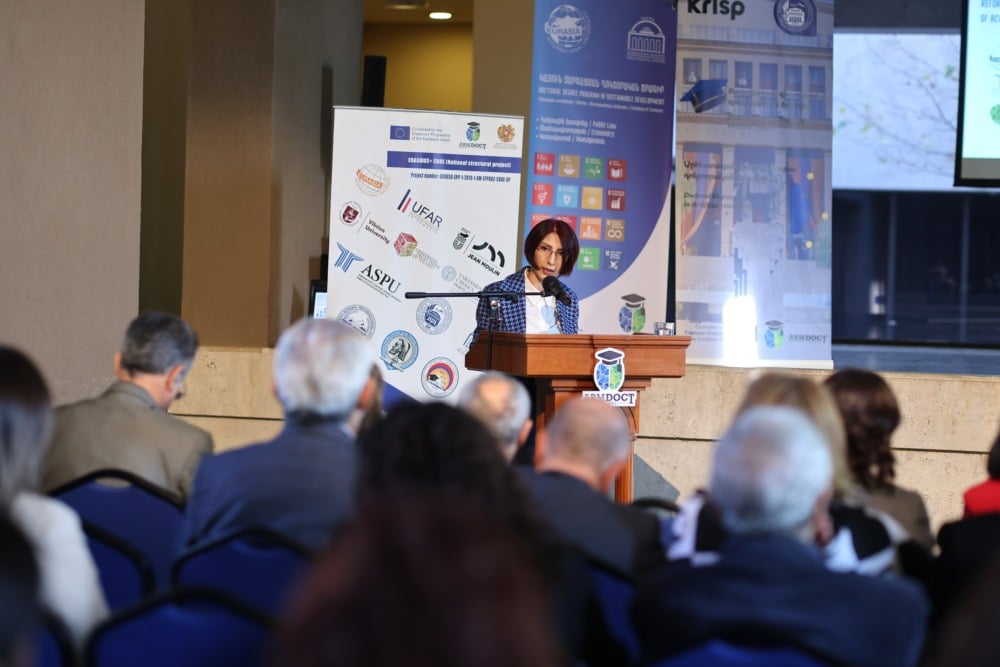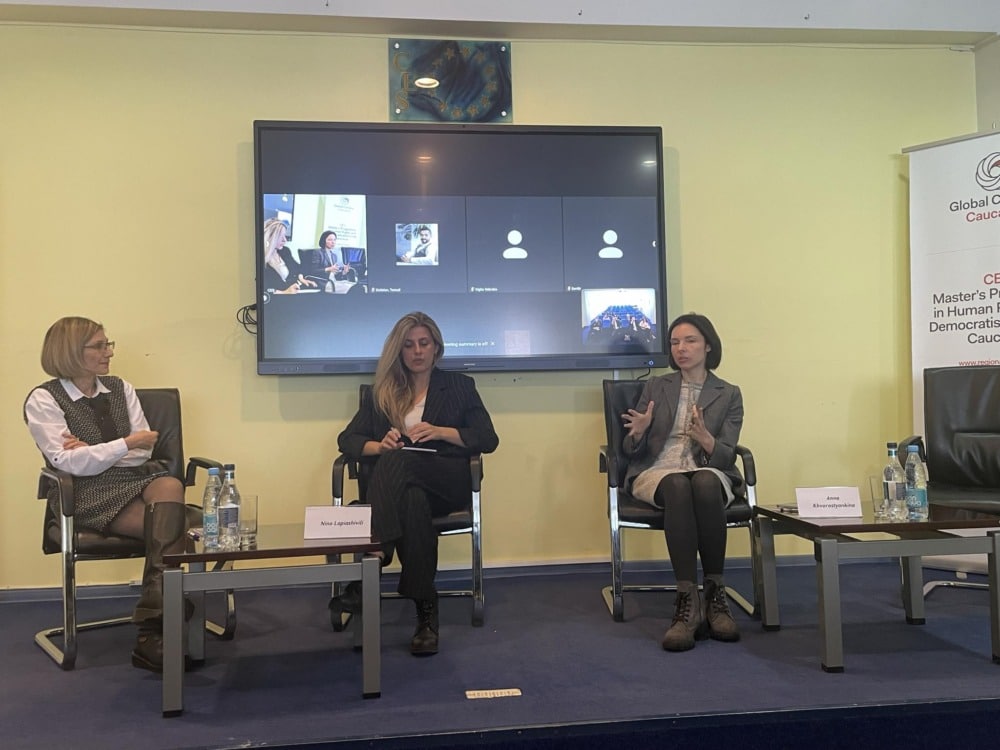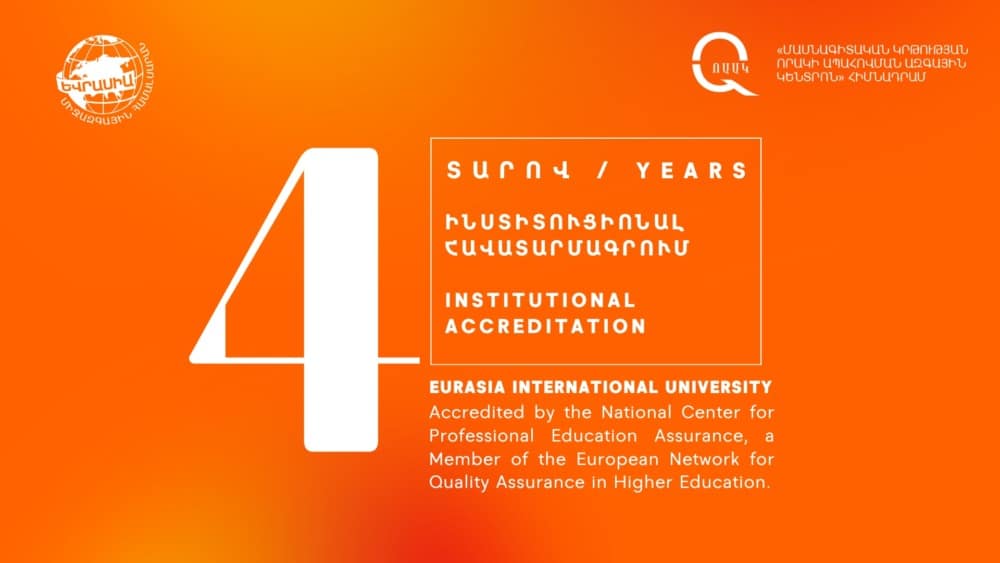SCHOOLS OF DOCTORAL EDUCATION AND NEW INDUSTRIAL PROGRAMS HAVE BEEN ESTABLISHED AT UNIVERSITIES
The conference devoted to summarizing the results of the EU co-financed national capacity development project ‘Reforming Doctoral Education in Armenia in Line with the Needs of Academia, Industry, and Current EU Practices’ (ARMDOCT) was held.
Eurasia International University, in collaboration with four EU and nine RA higher education institutions, as well as one research institute, coordinated the project. The implementation received direct participation and guidance from the Ministry of Education, Science, Culture, and Sports of the RA.
Within the framework of the project, the ‘Concept of Reforms for the Third Degree (postgraduate) Higher Education in the Republic of Armenia’ was developed and approved by the Ministry of Education, Science, Culture, and Sports of the Republic of Armenia. (KMS 16.11.2021 No. 44-L).


The researchers and experts involved in the universities conceptualized the existing problems in the field of postgraduate education and also defined the possible solutions as guidelines for further reforms.
Arevik Ohanyan, Head of Strategic Projects at Eurasia International University and Coordinator of the Armdoct program welcomed the attendees at the opening ceremony and emphasized that our research shows that almost all third-degree programs operating in the Republic of Armenia are specialized in a single area, the practice of interdisciplinary programs is not widespread, and there are limited instances of inter-university, university-academy institute, as well as university-industry collaborations. Within the framework of the ARMDOCT project, we have tried to develop new collaborative, interdisciplinary pilot doctoral schools, as well as industrial doctoral programs in partnership with leading organizations, which we hope will be developed after the conclusion of the program, becoming bright examples of high-quality doctoral education and training of competitive researchers. We hope that these programs will be attractive not only for the Armenian students but also for the international students, contributing to the influx of talented individuals”.
Arevik Ohanyan stated that it was not realistic to achieve new results and goals and face new challenges with the previous means and management system. She expressed hope that the program contributed to the localization of new and alternative solutions. Additionally, she anticipates that the developed legal documents will be useful for higher education and for informing further reforms. “Especially in the fields of science and technology, the doctorate is no longer just an ‘invitation ticket to teaching’; on the contrary, it prepares researchers to contribute to increase the competitiveness of the economy, promote innovation, and advance scientific and technological progress”.
At the opening ceremony, the participants of the forum were also welcomed by Lana Karlova, the Coordinator of the Erasmus+ National Office in Armenia, and Davit Avagyan, the Head of Programs of the European Union delegation. They highlighted the wide range of visible results achieved during the project and the opportunities created for their implementation.
It should be noted that within the framework of the program, postgraduate education programs with an industrial orientation were established, and cooperation was established between universities and the National Academy of Sciences of the Republic of Armenia, including the creation of cooperative doctoral schools (consortiums). Additionally, new postgraduate educational programs were developed in innovative and promising specialties.
- “The Technical Sciences” industrial postgraduate joint educational program offered by the National Polytechnic University of Armenia in collaboration with the Armenian Atomic Power Plant.
- “Artificial Intelligence and Machine Learning” postgraduate industrial educational program offered by Yerevan State University and Crisp Technology Company.
- “Sustainable Development” oriented consortium of doctoral schools by Eurasia International University and the Scientific and Educational International Center of NAS of the RA.
- “Computer Sciences” cooperative doctoral school in Armenia by the French University and the Institute of Informatics and Automation Problems of the National Academy of Sciences of the Republic of Armenia.
- The “Special Education” doctoral school was also established by the State Pedagogical University of Armenia named after Kh. Abovyan, and as an experimental, pilot project was approved by the scientific council of the university.
- Yerevan State Medical University named after Mkhitar Heratsi has developed an educational program focused on Neuroscience, for the implementation of which the university already has developed infrastructures and partnerships.
- Applied Linguistics and Digital Humanities educational programs were launched by Brusov State University after Valery Brusov.
- Vanadzor State University named after Hovhannes Tumanyan has improved the educational programs of the third degree of postgraduate education, as well as developed the necessary documents for co-management.
At the end of the event, all Armenian universities and research organizations that are members of the consortium, as well as the Enterprise Incubator Foundation, which joined the initiative, signed a memorandum of understanding, reaffirming their collective commitment to jointly develop third-level higher education programs in Armenia.
All the documents developed by the universities are available in the results section of the official website of the program. Shortly, editable versions of all standard documents will also be available, enabling download, modification, and localization according to the institutional needs.
The ARMDOCT project aims to ensure the comparability of doctoral education in Armenia with the European Salzburg principles, through the review of national policy and legal regulatory documents, institutional procedures, and the development of a system necessary for the integration of science, research, and industry. The program specifically targeted three of the Salzburg principles promoting the diversity, innovative structures, and mobility of doctoral programs.


